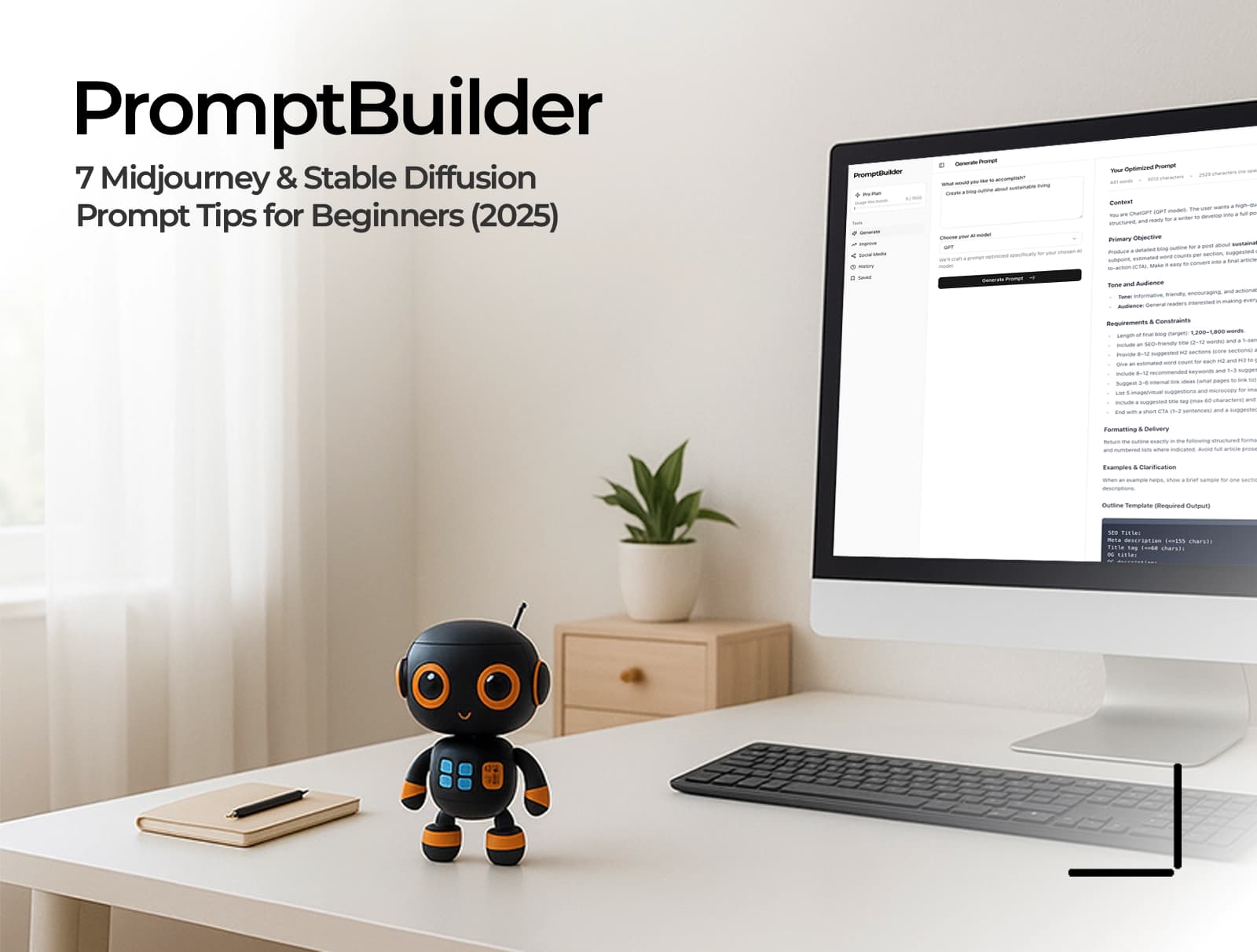7 Midjourney & Stable Diffusion Prompt Tips for Beginners (2025)

Midjourney and Stable Diffusion can make impressive images, but they cannot read your mind. When a prompt is short, the model has to guess, which is why the output can swing a lot even when your idea stays the same.
Here are seven prompt habits that make results easier to repeat. Each tip has a quick before/after example, plus a few starter prompts at the end.
If you are new to prompt writing in general, start with How to Write Effective AI Prompts or the shorter Prompt Engineering for Beginners.
If you want a longer walkthrough, read Prompt Engineering in 2025 and this round up of Prompt Frameworks.
TL;DR
- Name the subject and the look.
- Add composition and camera hints.
- Call out lighting and color.
- Use negatives to remove common issues.
- Set aspect ratio and size for where the image will be used.
- Change one thing at a time.
- Use references without copying living artists.
Tip 1: Start with a specific subject and a look
Bad:
cool nature scene
Good:
epic alpine scene, dramatic snow capped peaks, winding river, golden hour
style: photorealistic, ultra wide, high dynamic range
Why it works: You told the model what the scene is, what details matter, and what kind of image you want back.
Tip 2: Add composition and camera hints
Useful phrases: “wide angle,” “close up portrait,” “rule of thirds,” “overhead,” “macro,” “35mm film.”
Example:
close up portrait, centered, shallow depth of field, 85mm lens, bokeh background
Tip 3: Spell out lighting and color
Lighting changes the mood fast.
Examples: “soft diffused light,” “golden hour,” “neon rim light,” “studio softbox,” “moody chiaroscuro.”
cinematic still, teal and orange color grade, backlit haze, volumetric light
Tip 4: Use negative prompts to remove junk
What is a negative prompt? Text that tells the model what to avoid.
Starter negatives:
text, watermark, logo, low quality, blurry, extra digits, deformed hands
Stable Diffusion example (prompt + negative):
prompt: futuristic city skyline at dusk, ultra detailed, reflections on water
negative: text, watermark, lowres, noisy, oversaturated
Tip for Midjourney: you can also use --no (example: --no text --no watermark) to push away unwanted elements.
Tip 5: Match aspect ratio and size to the job
- Midjourney: add
--ar 16:9(or 1:1, 9:16, 4:5) - Stable Diffusion: set width/height (e.g., 1024×1536 for verticals)
Wide view example (Midjourney):
sunset over lavender fields, aerial perspective, soft haze --ar 16:9
Tip 6: Iterate with small changes
Workflow:
- Generate a baseline
- Tweak one variable (style, lighting, color)
- Compare outputs
Example iterations:
v1: portrait, natural soft light
v2: portrait, golden hour backlight
v3: portrait, neon edge light, moody shadows
If you want a simple way to track variations, see Prompt Testing, Versioning, and CI/CD.
Tip 7: Use references and style hints without copying
Describe inspirations (genre, era, medium) rather than naming living artists.
Examples: “baroque oil painting,” “1920s travel poster,” “cyberpunk neon,” “studio fashion editorial,” “isometric pixel art.”
Midjourney vs Stable Diffusion: Quick Notes
- Midjourney
- Use parameters like
--ar,--stylize,--v(version) - Descriptive phrases work well, so keep the structure simple
- Use parameters like
- Stable Diffusion
- Strong effect from negative prompts and weights
- You can use emphasis like
(keyword:1.2)in some UIs
Starter Stable Diffusion prompt:
prompt: elegant product photo on white background, soft studio light, subtle shadow, high detail
negative: watermark, text, reflection, harsh shadow, lowres
Before and after prompt examples
Logo (vague to specific)
Bad:
make a cool logo
Good:
minimalist logo for a coffee roastery named "Peak Roast"
style: geometric mark + modern sans serif wordmark
colors: charcoal, warm copper accent
output: vector style, flat background, centered
negative: gradients, bevels, busy details
Character (vague to specific)
Bad:
fantasy character
Good:
fantasy ranger, leather cloak, ash blonde hair, green eyes, woodland setting
style: cinematic portrait, shallow depth of field, 85mm lens, bokeh
lighting: soft rim light, cool ambient
negative: extra fingers, distorted hands, watermark, text
Try these starter prompts
Nature scene:
misty rainforest valley at sunrise, low clouds, saturated greens, birds in distance
style: photorealistic, wide lens, rule of thirds, high detail
negative: text, watermark, oversharpened, washed out
Product:
wireless earbuds, macro hero shot, white cyclorama, soft gradient, subtle reflection
style: ecommerce studio lighting, high clarity
negative: dust, fingerprints, watermark, text
Poster:
retro travel poster of Kyoto in spring, limited palette, screen print texture
style: 1920s art deco poster, bold shapes, clean typography area
negative: photo texture, gradients, busy background
Want a faster way to build prompts?
If you want help formatting prompts and saving versions, try the AI Prompt Generator. If you are working in ChatGPT, the ChatGPT Prompt Generator is a good place to start.
Pricing is here: Pricing

